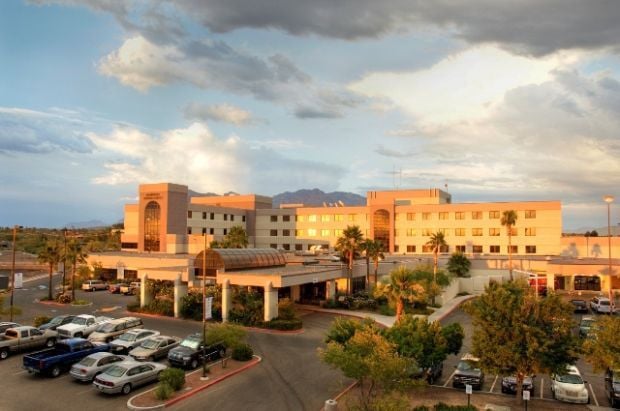Southern Arizona’s largest physician group is calling on Northwest Healthcare and UnitedHealthcare to do “the ethical and moral thing” and reach a truce for the sake of patients.
“If the impasse is not bridged, where will these folks go — the emergency room or walk-in clinic?” asked Pima County Medical Society President Dr. Susan Kolata.
Monday is the deadline for contract negotiations, and a stalemate continued as of Friday afternoon.
The contract dispute threatens to leave thousands of Tucson-area residents with UnitedHealthcare unable to use any Northwest Healthcare facility, including its primary-care physicians, urgent-care facilities and its two hospitals — Oro Valley Hospital and Northwest Medical Center, except for emergencies.
“We remain committed to reaching an agreement with Northwest Healthcare that preserves access to the important care Northwest provides in the Tucson community,” UnitedHealthcare officials said in a prepared statement.
Dave Allazetta, Arizona Health Plan CEO for UnitedHealthcare, was in Tucson on Thursday and made an in-person proposal to Northwest Healthcare CEO Kevin Stockton as they met for an hour, UnitedHealthcare officials confirmed. But there was still no word on an agreement.
A contract termination would affect UnitedHealthcare’s Medicaid, Medicare Advantage and commercial plans (but not MediGap plans). UnitedHealth officials say they have a transition-of-care plan in case the contract isn’t resolved.
Patients receiving ongoing treatment for special conditions, or women in their third trimester of pregnancy, may be eligible for continuation of care benefits.
Officials with Northwest Healthcare, which is owned by Tennessee-based Community Health Systems, said late Friday that negotiations would continue and they were hopeful for a resolution.
“Unthinkable”
Pima County Medical Society’s Kolata said both sides need to set aside their difference and focus on people. “To do otherwise would be unthinkable, wrong,” she said.
While ERs and walk-in clinics “play their part in providing care, they are no substitute for the doctor who has literally cared for them for years and even decades and have become more than the occasional patient but friends,” she said.
Pima County Medical Society board member and past president Dr. Tim Fagan said he cannot recall the organization ever before publicly weighing in on an insurance contract negotiation. But he characterized the situation as critical — he’s seen estimates that between 20 and 40 percent of patients served by Northwest Medical Center and Oro Valley Hospital are covered by UnitedHealthcare.
“We’re talking about tens of thousands of patients. We already have a shortage of primary-care doctors and other specialties in the Tucson area,” he said. “Some people will have to wait six months to a year to establish care with other physicians.”
Not only could patients be affected, but a failure to resolve the contract has the potential to overburden other hospitals and systems in the Tucson area, he said.
11th-hour truce
While such disputes often get settled at the 11th hour, San Diego-based health strategist Nathan S. Kaufman of Kaufman Strategic Advisors says he’s seen results go both ways. Kaufman has helped negotiate managed-care contracts, usually on behalf of hospitals, for decades.
“It depends on the relative power of each side. The research shows that health plans will pay providers as much as a 300 percent difference. And the determination of how much they get paid is how bad the health plan needs those providers in their network,” he said.
“What we say is if you are geographically indispensable, the probability is that you will be able to get a better rate and an easier negotiation than if you are not. If you are geographically indispensable, you usually settle at the eleventh hour.”
Some patients, especially seniors and people with chronic illnesses on the northwest side, could make the argument that Northwest’s facilities meet a geographical need. Those patients, including older residents of Marana and Oro Valley, are contemplating a future where they have to get multiple new doctors and drive a longer distance to get care their insurance will cover.
Both sides of the dispute have written newspaper op-eds, as well as letters to patients. Northwest Healthcare said it sent out more than 60,000 letters to UnitedHealthcare patients who had used a Northwest facility in the last year. It also set up a website called Stand Up to United Az.
The dispute appears similar to one that occurred in late 2015 with BlueCross BlueShield of Arizona and the Southern Arizona Carondelet Health Network, but it is potentially more dire for patients.
The UnitedHealthcare/Northwest standoff is occurring mid-year and not during open enrollment, so patients don’t have an opportunity to change their insurance plan, like they did in the BlueCross BlueShield/Carondelet disagreement, which was settled at the last minute.
Incongruous statements
It’s difficult to pinpoint the main issue in the dispute as both sides have distinctly different portrayals of what they are arguing about.
Northwest says UnitedHealthcare wants a 25 percent reduction in reimbursement for the services that Northwest provides.
UnitedHealthcare officials say the hospital system is demanding a 27 percent rate increase for employer-sponsored and individual health plans over the next three years.
And UnitedHealthcare also says Northwest Healthcare is refusing to agree to a “value-based” model of reimbursement based on quality measures like mortality and readmissions. They say other hospitals in town have all agreed to that model.
In response, Northwest officials have said they participate in quality-based programs with all other major insurers.
“The only power you have in a negotiation is the power of public opinion. So if the people who are United beneficiaries say they aren’t going to sign up next year because of what you did to my hospital, then United might cave,” said Kaufman, the health-care consultant.
“If United says the hospital is unreasonable and they feel comfortable that they can move the patients someplace else, then it would have to be the hospital that caves.”





